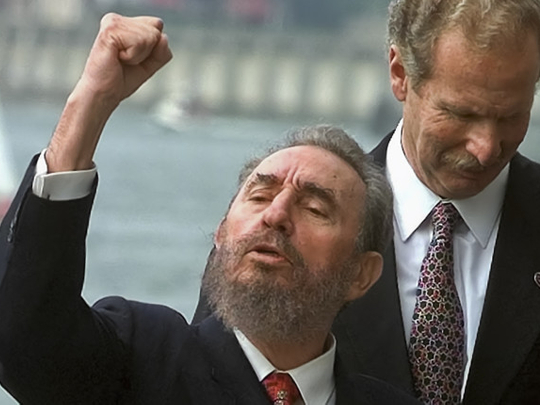
Over the weekend, Algeria declared eight days of mourning to honour the passing of Cuban leader Fidel Castro, who died on Friday. In a statement, ailing President Abdul Aziz Bouteflika said Castro’s death “is a great loss for the Algerian people.”
Though he ruled a small island nation thousands of miles from North Africa, Castro was a titan of 20th-century geopolitics and an inspirational figure for many societies emerging from the yoke of European colonialism.
Not long after his armed revolution won power in Cuba in 1959, Castro’s envoys met with Algerian rebels locked in a bitter liberation war against France. In the years prior, Cuban intellectuals chafing under a pro-American dictatorship had looked on with admiration at the Algerian struggle. The respect was mutual: While in a French prison, Ahmad Ben Bella, the socialist who later became Algeria’s first president, claimed he followed reports of the unlikely victories of Castro’s guerrillas.
In 1961, Castro’s Cuba arranged for a small shipment of arms to be sent to the Algerian rebels from Havana; 76 wounded Algerian fighters and some 20 Algerian children, mostly war orphans, were brought back west. After the eventual Algerian triumph in 1962, ties deepened. Cuban doctors were dispatched to help staff the fledgling nation’s hospitals (about 1,000 or so still work there), and Cuban military personnel helped train the Algerian army.
The two new regimes styled themselves as agents of a new, post-imperial order, free of the tyranny of Western colonialism and capitalism.
“The peoples of Algeria and Cuba have faced huge obstacles and fought hard and beautiful battles for their independence and self-determination,” Castro declared upon Ben Bella’s visit to Havana in 1962. “Both revolutions are irreversible.”
Frantz Fanon, the charismatic, Caribbean-born leftist ideologue of the Algerian War, expressed his admiration for Castro in his famous treatise of anti-colonial revolution “The Wretched of the Earth.” Here was a political figure standing up to centuries of Western slaughter, oppression and exploitation.
“Castro sitting in military uniform in the United Nations Organization does not scandalize the underdeveloped countries,” wrote Fanon. “What Castro demonstrates is the consciousness he has of the continuing existence of the rule of violence.”
That proved prescient perhaps for reasons Fanon did not intend.
In Cuba and Algeria, the revolutionary forces entrenched themselves and presided over stifling single-party states where dissent would be brutally quashed. But the “Third Worldist” solidarity they shared was very real and marked a defining period in the history of the Cold War, as well as Arab world politics.
Even as Cuba fell under the orbit of the Soviet Union, Castro became a key player within the Non-Aligned Movement, a global bloc of decolonised nations that sought — and, critics would say, mostly failed — to chart a third way in a world carved up between the interests of Moscow and Washington. This leadership role would see Cuba join in the revolutionary struggles of a host of nations in sub-Saharan Africa, often against regimes or colonial arrangements backed by the United States.
Castro’s influence in the Middle East was also particularly pronounced: In 1959, Castro ally Che Guevara toured the region, seeking to link the Cuban struggle with the socialist, nationalist movements then sweeping the Arab world. Castro would find common cause with a series of towering Arab strongmen: Egypt’s Jamal Abdul Nasser, Syria’s Hafez Al Assad and Libyan dictator Muammar Gaddafi.
Castro championed the Palestinian freedom struggle and became a friend of Yasser Arafat, leader of the Palestine Liberation Organisation. Cuba offered the Palestinians military aid, while Palestinian students could be found at universities in Cuba.
“Cuba has always been a strong supporter of Palestinians in all realms: political, military, vocational training,” Mansour Tahboub, former acting director of the Arafat Foundation, recently told Al Jazeera. “The Cubans trained Palestinian cadres, and Fidel himself was a staunch advocate of the Palestinian quest for freedom and independence.”
Such active support was part of Cuba’s wider ambition to resist “imperialism,” seen most notably in its deployment of troops on behalf of leftist forces in Angola, as well as its vocal denunciation of apartheid in South Africa when western governments saw the white supremacist regime as a bulwark against communism.
But often Castro’s actions appeared to be an extension of Soviet policy. Cuba dispatched military personnel in 1973 to Syria — a Soviet ally — during the Yom Kippur War with Israel and would also get entangled on the losing side of Yemen’s civil war. The Soviet invasion of Afghanistan was a blow to Cuban policy in the Muslim world: The intervention was deeply unpopular in the region as well as among the countries of the Non-Aligned Movement; Castro’s muted acceptance of it diminished his Third Worldist chops.
Still, Castro’s embrace of the 1979 Iranian revolution — which began as a leftist revolt against US-backed Shah Mohammad Reza Pahlavi and morphed into a religious takeover — won him enduring sympathy in the Islamic republic, no matter Havana’s avowed policy of state atheism.
In 2001, Castro’s first visit to Iran had the pageantry of a VIP head of state and the star power of a major celebrity.
But the shifting political landscape of the Middle East and the end of the Cold War led to Castro’s increasing irrelevance. When Arab politics were defined by a brand of secular and socialist nationalism, a Cuba backed by billions of dollars in Soviet aid could find ways of exerting influence. Shorn of Moscow’s largesse and facing a region convulsed by sectarian conflicts, it had less to say.
“In general, you have a sense that Cuban foreign policy became confused about the Middle East after the initial heyday of the 1960s and 1970s,” wrote Middle East historian Juan Cole. “When post-colonialism, Third Worldism and anti-imperialism were keynotes, Cuba had foreign policy successes. But the rise of Muslim fundamentalism as a revolutionary force was unwelcome in Havana.”
— Washington Post
Ishaan Tharoor writes about foreign affairs for The Washington Post. He previously was a senior editor at Time.










